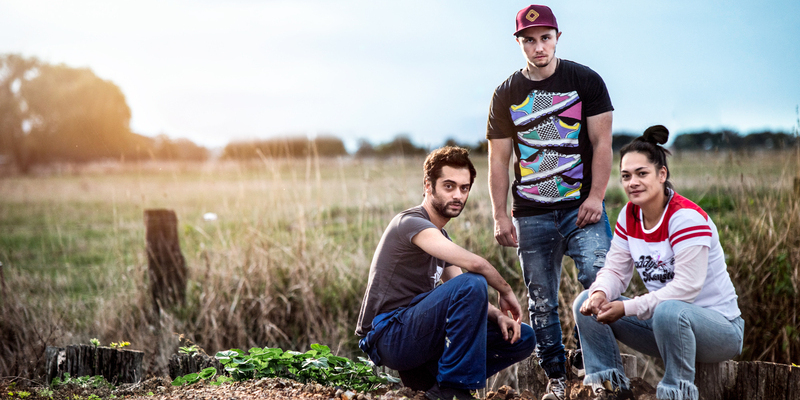
Interview by
Benjamin Poole
Caz (Elz Carrad), who has been living in Auckland and working as an
activist for sexual rights, arrives in the small dairy farming community
of Rūrangi, New Zealand, seeking to rebuild relationships with his friends
and estranged father. Following a decade of no contact, even after the
death of his mother, at first they do not recognise him and struggle to
accept him back into the fold of the small, close-knit community.10 years
is a long time, and a lot has changed. Returning was never going to be
easy but eventually, as wounds begin to heal and old flames rekindle, his
loved ones start to understand his decision to leave.
Winner of the Frameline Audience Award, Max Currie’s critically
acclaimed film is a powerful and authentic story interweaving themes of
environmentalism, identity, and the strength of finding acceptance.
We spoke with Currie about his drama.

Rūrangi explores issues which are very pressing. I was
wondering what sort of research you did when developing the character
of Caz?
I imagine when the cis directors of old were venturing into the trans
world to tell stories - they did research. But
Rūrangi is written by a trans activist, and
Elz Carrad, who plays Caz, is trans. So it was more a case of
collaborating with my incredible team, listening to them and trusting
their experience - than researching, which is a bit outside-in. There
was an intense period of about six weeks where I drove to Cole's flat
every week day (with an office chair in the back of my car). We went
through every line, every beat, of every scene, and I asked him about
what he was trying to say with it and why.
Elz Carrad really inhabits the character. Is the similarity between
the names of the actors and the characters deliberate?
Just one of many, magical coincidences - much like the cat that appears
from nowhere in a scene. The name 'Caz' is the name writer Cole
Meyers used a lot for characters when he'd play video games.
How far did Elz’s own experiences inform the character?
Elz's experiences hugely informed the character. In fact, we rewrote
parts of the character for Elz - for example, the fact that Caz is
Māori. Elz also comes from a very small, remote rural town. There's some
big differences, too. Caz is gay but Elz is straight and married with
kids. He's also never set foot in trans activist circles.
Rūrangi is one of several films I have reviewed over the last
12 months which feature trans characters and which base plots around
their specific experiences. I feel that these films are hugely
important for the culture, in the sense that they create both empathy
and understanding for the trans community. I’m interested, however, in
your take on why it has taken cinema so long to sympathetically
explore the transgender experience. As welcome as this new ‘canon’ is,
why is it only happening now?
It's a direct result of trans people being more visible, more empowered,
more supported, feeling safer, connecting with role models - and being
trusted with more opportunity. Rūrangi was written by,
co-produced by, crewed by and stars trans and non binary talent. We also
ran a director internship program. I think the change also comes from
producers like Craig Gainsborough, who is passionate about
challenging the traditional production model.... there's also,
invitably, commercial factors, and we need to thank the streamers here.
The streamers have allowed niche content to find large, dedicated
audiences on a global scale - so there's more commercial justification
behind giving trans people and trans stories funding.
The industry is changing daily, and apparently nobody knows anything,
etc. I note that Rūrangi was originally conceived as a
television mini-series. In this era where TV, film, social media etc
is considered ‘content’, where do you see the difference between TV
and film?
I increasingly see films as stories that deliver beautiful, satisfying,
transformative endings in one sitting. Although TV series do end,
they're more about stories, characters and provocations that deliver
ongoing story. A great ending is magic.
Were there any adaptions made to the storytelling?
We created a non-linear narrative for the feature that serves the film
well, constructed around that moment when Caz's father answers the phone
and says "Who is this?". The rest of the film is an answer to that
question, right down to the last words spoken.
What did you find were the major challenges to making an independent
film?
Keeping everyone's faith and belief in what we're making alive and
buoyed up even when you're a year in and everyone's over it!
If there is one message you would want audiences to take away from
the film what would it be, and how does the film convey this
message?
Yes. It's that healing is possible. Part of conveying this is allowing
the audience to hurt with the characters' hurts first, then make it seem
impossible to find healing - and then deliver it.
If you could programme Rūrangi in a triple bill with two other
movies what films would they be and where would Rūrangi fall in
the line-up?
I'm all about contrast between courses. Start with Besson's
The Fifth Element to get everyone pumped, then switch to
something hypnotically unsettling like Glazer's
Under the Skin, then finish with the fiercely warm and gentle Rūrangi, so everyone gets a big hug at the end.
Rūrangi is in UK/ROI cinemas from
February 25th.
